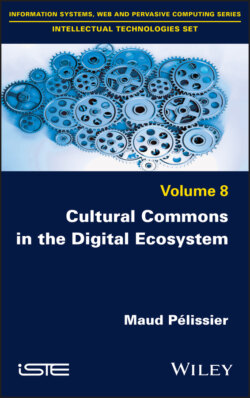Cultural Commons in the Digital Ecosystem

Реклама. ООО «ЛитРес», ИНН: 7719571260.
Оглавление
Maud Pelissier. Cultural Commons in the Digital Ecosystem
Table of Contents
List of Tables
List of Illustrations
Guide
Pages
Cultural Commons in the Digital Ecosystem
Introduction
PART 1. The Intellectual Movement of the Cultural Commons
Introduction to Part 1
1. The Pioneering Approach of Jurists from the Berkman Center for Internet and Society. 1.1. A critique of the maximalist doctrine of intellectual property
1.1.1. The enclosure of the intangible commons of the mind
1.1.2. The threat of disappearance of free culture in cyberspace
1.2. The political economy of information commons
1.2.1. Shared ownership and individual freedom
1.2.2. A new mode of information production. 1.2.2.1. An information structure conducive to the creation of the commons
1.2.2.2. Economic value and openness of information commons
1.2.2.3. An unprecedented collaborative production mode
1.2.2.4. An expansion of the mode of production of information commons
1.3. The creative commons in the field of works of the mind. 1.3.1. Incarnation of free culture practices
1.3.2. Institutionalization of free culture: Creative Commons licenses
1.3.3. The modalities of cohabitation with the commercial cultural economy
1.3.3.1. The non-market arrangements of creative commons: unfair competition?
1.3.3.2. Hybrid arrangements of creative commons
1.4. Propagation in the intellectual and militant sphere in France
1.4.1. The challenge of legalizing non-market sharing. 1.4.1.1. Contextualization of the DADVSI law
1.4.1.2. The space for debate and controversy
1.4.1.3. From global license to creative contribution
1.4.1.4. The outcome of controversies
1.4.2. The challenge of legal recognition of the information commons
Box 1.1.Proposed amendments to Article 8 of the Law on the Digital Republic (République numérique)
1.5. Recent extensions of the BCIS approach
1.5.1. The digital public domain: the perimeter of cultural commons
1.5.2. Network infrastructure as a commons
1.5.3. Remuneration of volunteer contributors
2. The Ostromian Approach to the Knowledge Commons
2.1. Ostrom’s original theory of the land commons. 2.1.1. An institutional definition of the commons
2.1.2. A questioning of the “tragedy of the commons”
2.1.3. Communal property as a bundle of rights
2.1.4. An institutional approach to the self-organization of common resources
2.2. The knowledge commons: Hess and Ostrom’s approach. 2.2.1. The singularity of information common pool resources (CPR)
2.2.2. Digital libraries as information CPRs
2.2.3. Institutional analysis and development framework (IAD)
2.3. Open access platforms as scientific commons?
2.3.1. Open access: a major transformation of the editorial ecosystem
2.3.2. Open access platforms: which bundles of user rights?
2.3.3. Enrichment and sustainability of the scientific commons
2.3.3.1. The enrichment of a scientific commons
2.3.3.2. The enrichment conditions of a scientific community
2.3.3.3. Obstacles and threats to the development of scientific knowledge commons
2.4. Cooperative platforms as social commons?
2.4.1. A rapprochement with the social and solidarity economy
2.4.2. Conditions for exploiting the social value created
2.4.3. Governance of cooperative platforms
2.4.4. Commoners’ remuneration: a right to contribute
PART 2. The Commons in the Digital Book Ecosystem
Introduction to Part 2
3. Digital Libraries as Heritage Commons
3.1. A favorable context. 3.1.1. A new documentary order
3.1.2. Cultural public data as a public good
Box 3.1.Content of the Etalab Open License
3.2. The production methods of heritage commons. 3.2.1. The Google challenge
3.2.2. Public/private partnerships: threat or opportunity? 3.2.2.1. The partnership between the Bibliothèque municipale de Lyon and Google Books
3.2.2.2. Partnerships between the Bibliothèque nationale de France (BnF) and market players
3.2.3. On-demand digitization and citizen contribution
3.2.4. The heritage commons: a plasticity of forms
3.3. Governance issue: enriching our common heritage
3.3.1. The construction of a shared heritage infrastructure
3.3.2. Content editorialization and digital mediation
4. The Written Commons in the Publishing Industry
4.1. The transformations of the editorial ecosystem. 4.1.1. Digital textuality and new uses
4.1.2. The digital book immersed in an attention economy
4.1.3. The digital book and the growth of self-publishing
4.2. Wattpad: a common narrative of the misguided written word
4.2.1. The use of CC licenses: a hidden reality
4.2.2. A progressive attraction to the attention economy
4.2.3. Strengthened cohabitation with publishers: the announced end of free culture
4.3. Self-publishing and free culture: a multifaceted face
4.3.1. The Lulu platform: open source for the book market?
4.3.2. In Libro Veritas and Framabook: free book editions
Conclusion
References
Index. A, B
C, D
E, F
G, H
I, L
O, P, R
S, T, V
WILEY END USER LICENSE AGREEMENT
Отрывок из книги
Intellectual Technologies Set
.....
Volume 8
Maud Pélissier
.....